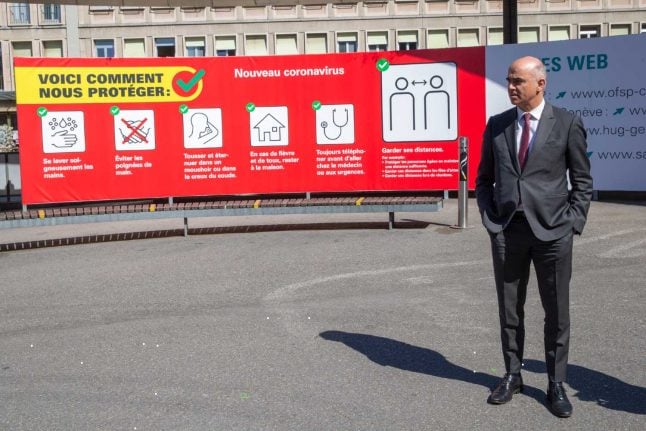Switzerland, which is among the countries that have conducted most COVID-19 tests per capita, is the fifth country in Europe to pass 10,000 officially-recorded cases.
It follows neighbours Italy, Germany and France, and Spain — all of which have far bigger populations.
EXPLAINED: Why does Switzerland have such a high rate of confirmed coronavirus cases per capita?
Elsewhere, China, Iran and the United States have also passed the five-figure mark, according to the latest World Health Organization situation report on the global pandemic.
Switzerland's Italian-speaking southern region of Ticino, which borders hard-hit northern Italy, is the worst-affected of its 26 cantons, with 393 cases per 100,000 people.
Around two-fifths of Switzerland's COVID-19 deaths have occurred in Ticino. The first case of the new coronavirus was confirmed in Switzerland on February 24.
READ: What you need to know about Switzerland's coronavirus testing regime
Since then, “91,400 tests have been carried out for COVID-19, of which 14 percent were positive,” the Federal Office of Public Health said.
Those testing positive have ranged in age from under one to 102, with a median age of 52 years old, and a near-even split of men and women.
'Too early' to ease restrictions
The Swiss government has ordered the closure of schools and all places of leisure, including restaurants, bars and non-food shops.
Last Friday it went further, banning all gatherings of more than five people, while anyone standing closer than two metres to others risks a fine.
“At the moment it would definitely be too early to talk about easing” the restrictions, health ministry official Daniel Koch, who is heading the Swiss response, told a press conference in Bern.
“We must first have proof that we have reached the peak of this epidemic — which unfortunately is not yet the case.”
Revelations this week that majority state-owned telecoms operator Swisscom would provide authorities with mobile phone data to monitor if people were adhering to the restrictions on public gatherings sparked an outcry.
But Koch said it was not a question of monitoring population movements in real time, but instead doing “retrospective analysis”.
Meanwhile some 3,800 to 4,000 troops — “the totality of the medical forces of the Swiss army” — have been mobilised, said Brigadier General Raynald Droz, chief of staff of the military's joint operations command.
The global number of officially-recorded infections has topped 480,000, with more than 21,800 deaths.



 Please whitelist us to continue reading.
Please whitelist us to continue reading.
Member comments